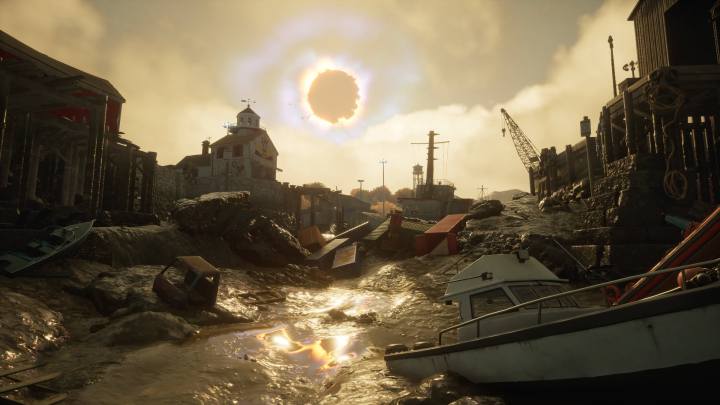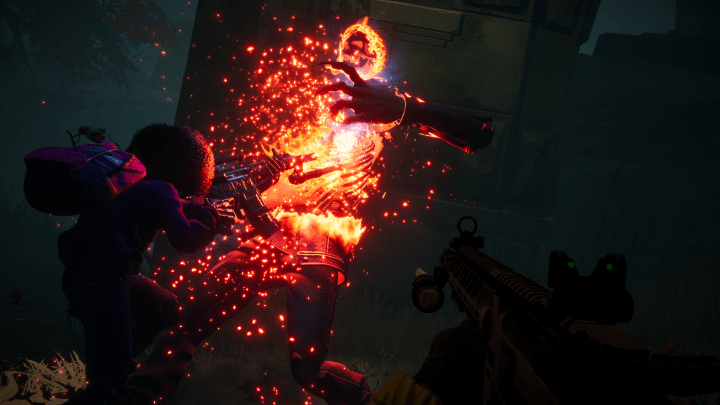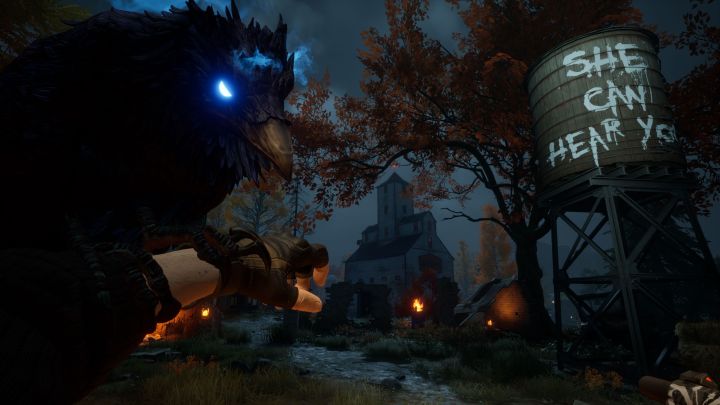Redfall isn’t just a fun vampire shooter. It’s a takedown of the ultra-rich
Redfall #Redfall

Right before I got to go hands-on for 90 minutes with Redfall, Xbox’s big spring exclusive, creative director Harvey Smith set the stage by introducing a new trailer focusing on the first-person shooter’s story. All I knew about the narrative up until then was that there was some failed experiment that turned a small Massachusetts fishing town into a vampire’s paradise. I’d soon learn that the real catalyst is much more politically charged: A group of ultra-rich elites working at a pharmaceuticals company called Aevum created the vampire disease in a selfish quest for immortality.
Whenever a video game like Redfall dives into real-world politics, you never know how creators at major studios will be willing to address that in a press interview. Creative talent at publishers like Ubisoft, for instance, have a history of downplaying politics in their games. Smith, on the other hand, does not mince words. During a 15-minute chat following my demo, Smith was quick to double down on Redfall’s fierce takedown of the ultra-rich, equating them to blood-sucking monsters.
“This is not new for us,” Smith tells Digital Trends. “You literally have aristocrats in Dishonored saying, ‘I made more money during the plague than I normally do because I’m selling the elixir at a 1,000% markup.’ That’s vampiric.”
That worldview doesn’t just inform Redfall, but puts it in lockstep with Smith’s long history of using games as a vessel for rich social commentary. Those who want to look away will find a fun vampire shooter here that has everything we’ve come to expect from an Arkane-developed game at this point, at least based on what I’ve played so far. Engage with what it’s getting at, though, and you’ll find a searing takedown of the 1% underneath all that blood.
An Arkane setting
Before actually getting to play Redfall, I was entirely unsure about what it was. A recent gameplay trailer made it out to be another spin on Left 4 Dead, emphasizing co-op shootouts over the hybrid RPG-action style Arkane is known for. Even Smith himself was all too aware of the difficulties of marketing a game that needs to be played to be understood (“Talking about music is like dancing about architecture,” he says on the subject).
I was immediately surprised to learn that Redfall is much more of a traditional Arkane game than I was expecting. I wasn’t paired with a squad during my playthrough, allowing me to experience it as a single-player game like Dishonored 2 or Deathloop. A lot of the hallmarks of those games were present in my playthrough. I’d discover a whole lot of audio logs and lore snippets building out the world, be given multiple ways of infiltrating a manor, and get a whole lot of story through environmental storytelling. In one building, I’d use context clues to realize I was walking through some sort of religious orphanage — an eerily empty one.
An early consideration was: How do we make New England feel like an Arkane setting?
Those details immediately recalibrated my expectations ,making it clear that the multiplayer component doesn’t signal a radical change for Arkane. It’s not a live-service game littered with microtransactions — Smith says there are none at all — it’s just an Arkane world that can be explored with friends.
Even the rural setting isn’t as much of a departure for the studio as it seems. In discussing Redfall’s fictional Massachusetts setting, Smith makes it clear that Arkane approached the location the same way it would Prey‘s Talos I: by treating it as a main character.
“An early consideration was: How do we make New England feel like an Arkane setting?” Smith says. “Whereas a lot of states feel like they tear everything down and rebuild it every 10 years, New England has that sense of history. You can’t help but walk around and feel the gravity of how many lives have been lived and ended here. Generations of families with hopes and problems, rising and falling, and no one even remembers most of them. It’s kind of inherently haunting.”
During my playthrough, I’d explore a quaint fishing town, gunning my way through one-screen cinemas and mom-and-pop gift shops. As a native Massachusetts boy who spent many summers in Cape Cod, I was delighted to see an authentic version of New England in a video game. The quiet, historic nature of the town provides an excellent contrast to its supernatural conflict, as psychic vampires stalk small-town streets. It has a playfully spooky aura that feels like trick or treating through Salem, Massachusetts, on Halloween night.
As an open-world game, Redfall seems impressively dense. Every stretch of land I walked through was entirely distinct, from a firehouse to a quiet hillside cemetery. As I stroll around, I discover safe houses I can claim, vampire nests to clear out, and several side-missions to tackle. But beyond those standard map markers, it’s a location I already really want to spend some time in. Smith believes Redfall’s density of interaction is higher than most games in the genre, and I can see that already; every area feels like it has its own history to be inferred with exploration.
Stake your claim
During my demo, I’d have access to the game’s four starting characters (more are coming via future updates, says Smith). I’m immediately pleased to see a lot of diversity among the roster, and that’s another aspect Smith emphasizes when I speak with him afterward. Though some players in recent years have complained about the idea of “forced diversity” in modern media, Smith points out that excluding non-white characters is much more of a deliberate, unrealistic choice.
“If you look at the last few Arkane games — Juliana and Colt, Morgan Yu, Billie Lurk, the cast of Redfall … It’s more like putting a camera out the window on the streets of Manhattan, taking a picture, and then looking at it and going, ‘Oh, this is human society,’” Smith says. “By contrast, a lot of media would take a picture of that scene and it would be 80% dudes and most of them white. That’s actually more political or fabricated and curated in a weird direction. [Redfall] is actually more natural.”
I choose Layla Ellison for my playthrough, as I’m thrown into a mission a few hours into the game. Her special powers wind up being a bit of a mixed bag for me. A primary ability lets her whip out a spectral umbrella that can block attacks and explode to inflict some damage. I never really get the hang of it during my playthrough, though I chalk that up to being thrown in the middle of a demo more than anything. I have more of a grasp on one of her other skills, where she summons a phantom elevator lift that can bounce her into the air. Again, I don’t fully grasp the nuances of it in 90 minutes, but I can see how I could master it and use it to rain lead down on vampires. Admittedly though, I’m left more curious about using those skills in a multiplayer context, which makes me wonder how satisfying individual characters will be in solo play.
There’s one ability I click with more than the rest, though. Layla’s ultimate ability lets her summon her sleazy vampire ex-boyfriend, who runs around killing enemies in the area. It’s a hysterical slice of comedy that gives me a taste of Redfall’s goofball side.
Gunplay feels about on par with Deathloop here — and that’s a strong compliment. Every weapon I tried was nice and snappy, making quick work of human cultists. The more intriguing twist, though, comes from how I have to fight vampires. I can shoot them with bullets, but that won’t actually kill them; vampires need to be staked, burned, or shattered to truly dispose of them. That opens the door for a wealth of creative weapons on top of your standard video game guns. A stake launcher allows me to fire wood directly into a vampire’s heart for an instant kill, flare guns act like a flesh-burning pistol, and UV beams will turn them to stone that can be shattered with a punch. When I correctly utilize every tool at my disposal, I feel like Buffy out on a patrol.
It did take a bit of time for me to fully get the hang of it all, though. I had quite a few deaths during my 90 minutes as I had to learn the best circumstances for each weapon or the right context to use my abilities. It feels like there’s a bit more of a learning curve here than with something like Deathloop due to it featuring two distinct enemy types (vampires and humans) that need to be dealt with in different ways. Even so, I’m already curious to play around with more guns and characters to find the vampire-killing play style that suits me best.
Yes, it’s political
When I sat down to talk to Smith after my demo, I initially figured we’d talk about those systems more than anything. Instead, he’d spend almost the entire chat digging into Redfall’s politics. That shouldn’t come as a surprise to anyone who’s followed Smith’s work through the years. Previous games he’s worked on, like Dishonored, deliver some pointed commentary on modern social issues. “Occasionally, I’ll get, ‘I miss your old games that weren’t political like Deus Ex,’ and it’s like, what are you talking about?” he tells Digital Trends.
“Deus Ex is about the fear of coming technologies. Like Dishonored, it’s about who has the power. Is the power concentrated in a group that thinks they know best? Is it concentrated in a benevolent AI? In Dishonored, is it in the hands of the guards? The aristocrats? Certainly not the poor. What if it was in your hands? Would you be a butcher or surgical and cautious, realizing that every person you kill has someone who needs them?”
We live in a world where a tiny percentage of people are living greater than kings of old.
Redfall is no different, and Smith is more direct about that than ever here. He’s quick to point out that the vampires aren’t just goofy monsters for the sake of making a horror-tinged shooter; he’s using them to deliver a brutal critique on the ultra-rich.
“Monsters are always metaphors, and we live in a world where a tiny percentage of people are living greater than kings of old,” Smith says. “Private jets, multiple mansions, islands … as they’re draining the life out of the world. Profits for a tiny group of people are historically high even as rivers are drying up. There are places in Texas where you literally can’t drink the water now. So vampires seemed like the perfect metaphor. Science-based, biomedical, startup vampires fit right into a world with Theranos and Palantir.”
While I don’t get a full taste of that in my gameplay-focused demo, Smith’s thinking here has me more interested in Redfall than anything I actually played. It’s rare that we get to see a big-budget video game seriously grapple with these topics. Some pay lip service to big social issues, but often stop short of offering a strong viewpoint. Redfall isn’t shying away from those conversations, and that’s partially due to Smith’s philosophy on media and what it inherently communicates, even when creators themselves don’t want to engage with it.
“You can entirely ignore that and shoot the vampires in the face, and that’s fun. And I think most people probably play that way,” Smith says. “But in all media, there’s something about the relationship to power in it. There’s something about people’s thoughts on their own mortality. There’s something about the relationship between people and the people they love. It’s built into everything, and it kills me that sometimes people are like, ‘What if we didn’t have any of that?’ What do you mean!? How do you talk about anything?”
When Redfall launches, I’m sure much of the conversation will be centered around how its shooting feels or its function as a co-op game. I’d wager that many readers checking this preview out are here to learn that very thing. But it’s clear that Smith and Arkane are striving for something a bit deeper than “Left 4 Dead but with vampires.” Underneath its superpowered shooting, Redfall hopes to speak truth to power by taking aim at the real “bloodsuckers” in our own society. How could someone like Smith resist a chance to make an artistic statement when there’s so much chaos in the world that needs addressing?
“The world we’re living in right now is no joke,” Smith says. “When we started this project, we went through a pandemic … We went through an insurrection and went through having a leader that was terrifying. We went through people marching through the streets with torches shouting things that seemed fascist-adjacent. There were murder hornets. The air force was talking about UFOs. There’s a war. Literally some of the people working on this game are in Ukraine. That’s the world we’re living in.
“The thing about this project is it’s taken longer than expected because we love it and want to do right by players … but my God, what an ordeal.”
Redfall launches on May 2 for PC and Xbox. It’ll be available on Game Pass.
Editors’ Recommendations



